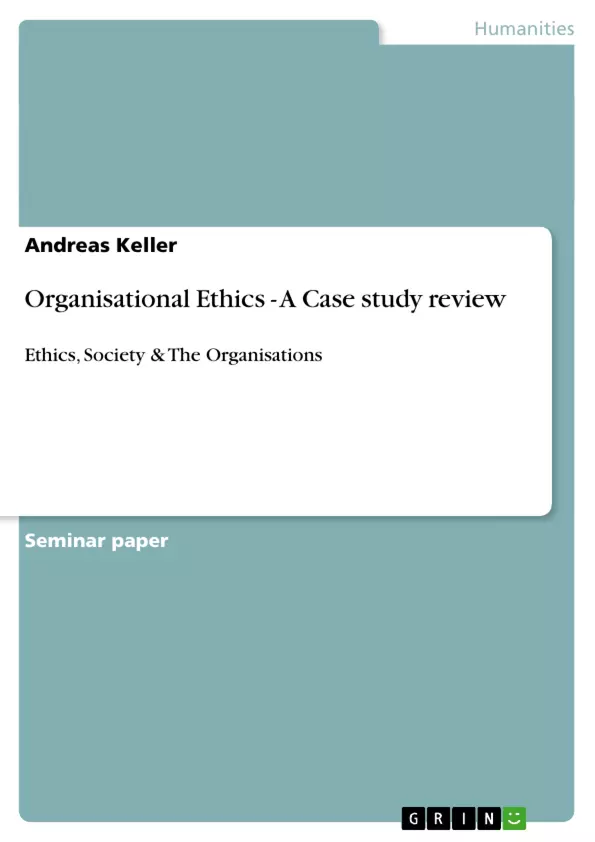The origin of the word “ethics” is derived from the Greek word “êthos” , which, in a more precise translation, might be better rendered as “image”. The science of ethics, as it became established in the eighteenth and nineteenth century, was concerned with the search for absolute standards of conduct guiding decisions and actions, and was closely tied to the concept of duties derived from core values . Since ethics itself, as moral philosophy, set out to establish generally accepted standards of right and wrong, the word ‘moral’ became interchangeable with ‘ethics’, although the former originally referred to the act and the latter to the abstract principle from which the act was derived. In the meantime, “being ethical or moral” has come to imply conforming with specific (generally acceptable) standards, whereby the initial agenda of establishing universally applicable moral principles has been replaced by the realisation that groups of people can also adhere to or deviate from a set of their own ethical standards. From this, it follows that such standards can be established by an individual, a corporation or a nation to help or guide decisions and actions. Schoen (1979 ) even sees the metaphors employed as vital to the framing of issues, since these guide both what is deemed to be a problem and the paradigms used in addressing them. This notion of defining problems and paradigms is clearly applicable to managers and leaders paid to make organisational decisions congruent with the organisational culture, whereby the choices they have to make may vary in terms of the perceived ethical solution selected from a range of alternative solutions. A general central part of management and organisations is its study of organisational culture, although this has, as yet, only received minimal attention – and even less in its relation to issues in moral psychology (Feldman, 2002 ). Yet since an individual’s identity comprises stable mental and physical characteristics, it would seem that understanding individual personality is a crucial step in managing oneself and others effectively (Weiss, 2001 ).
Organisational ethics often conjures up companies such as Enron, ImClone, Tyco and WorldCom, with their spectacular headlines on ethical failures at the very top of organisations. However, such executive management blowouts, while dramatic, are nonetheless rare.
Inhaltsverzeichnis (Table of Contents)
- Abstract
- Introduction & Context
- Literature Review - Theory
- Organisational Ethics and its Components
- Transactional vs. Transformational Directives
- Ethical Dilemma Decision Model
- Case Study Review
- Clinical Ethics
- Market Outcomes
- The Commercial Moral of the Story
- Business Ethics
- Outcomes
- What I learnt
- Clinical Ethics
- Discussion
- Conclusion
Zielsetzung und Themenschwerpunkte (Objectives and Key Themes)
This paper provides a personal reflection on organisational ethics, analyzing personal experience through the lens of recent research on ethics, moral behaviour, and its implications in an organizational setting. The author aims to offer a detailed analysis of the subject matter by reviewing current literature and applying it to a personal case study.
- The role of ethics in organizations and the impact of individual decisions on organizational culture
- The importance of leadership and ethical decision-making in maintaining an organization's integrity and trust
- The different models and frameworks for ethical decision-making within organizations
- The distinction between transactional and transformational leadership styles in relation to ethical conduct
- The relationship between ethical behaviour and organizational success
Zusammenfassung der Kapitel (Chapter Summaries)
The paper begins with a detailed introduction on the concept of ethics, tracing its roots to the Greek word "êthos" and exploring the evolution of its definition. It emphasizes the importance of ethical conduct in organizations, particularly in the context of day-to-day decision-making and its impact on maintaining organizational integrity. The paper then delves into a literature review, examining key theories and frameworks related to organizational ethics, including the components of ethical analysis, transactional vs. transformational leadership directives, and a model for ethical decision-making. The case study section offers a personal reflection on the author's experience in managing a start-up company, focusing on the challenges of conveying a commitment to ethical conduct to customers, employees, and the wider professional environment. This section is further divided into two parts, analyzing the ethical implications of the author's experience from both clinical and business perspectives. The paper concludes with a discussion of the key takeaways from the case study and the importance of ethical considerations in organizational decision-making.
Schlüsselwörter (Keywords)
This paper examines ethical considerations in organizations, specifically focusing on the individual's role in ethical decision-making, leadership styles, models for ethical analysis, and their impact on organizational integrity and success. Key themes include ethical decision-making, organizational culture, leadership, trust, and the impact of individual actions on organizational outcomes.
Frequently Asked Questions
What is the origin of the term "ethics"?
The word "ethics" is derived from the Greek word "êthos," which can be translated as "image" or "character," referring to standards of conduct guiding actions.
What is the difference between transactional and transformational leadership in ethics?
Transactional directives focus on compliance and specific standards, while transformational directives aim to inspire ethical behavior through core values and organizational culture.
How does individual personality affect organizational ethics?
An individual's identity and stable mental characteristics are crucial for effective self-management and decision-making, which ultimately shapes the ethical climate of the organization.
Are ethical failures limited to top executive management?
While spectacular failures like Enron or WorldCom make headlines, organizational ethics applies to day-to-day decisions at all levels, influencing integrity and trust within the company.
What role does organizational culture play in ethical decision-making?
Organizational culture provides the paradigms and frames used by managers to define problems and select solutions from a range of alternatives based on shared ethical standards.
- Citation du texte
- MBA Andreas Keller (Auteur), 2004, Organisational Ethics - A Case study review, Munich, GRIN Verlag, https://www.grin.com/document/121276



